In today’s fast-paced digital world, SMS (Short Message Service) remains a cornerstone of communication, enabling quick and efficient messaging across mobile devices.
This article explores the ins and outs of SMS—how it works, its benefits, limitations, and its various applications in both personal and business contexts.
Whether you’re looking to understand its role in marketing or the future possibilities with technologies like RCS, this comprehensive guide will keep you informed and engaged.
Key Takeaways:
- SMS is a text messaging system used for personal communication, business notifications, and authentication purposes.
- SMS transmits up to 160 characters per message and is quick, cost-effective, reliable, and widely available.
- SMS limitations include a limited character count, reliance on cellular network coverage, and vulnerability to security breaches.
What is SMS?
SMS, or Short Message Service, is a widely recognized text messaging system that facilitates the exchange of brief written messages between mobile devices. Initially conceptualized by experts Friedhelm Hillebrand and Bernard Ghillebaert, SMS has transformed the way people communicate in their personal and professional lives, allowing for instantaneous communication that is both efficient and effective.
In the digital era, SMS plays a pivotal role in marketing strategies, particularly among American adults, where it serves as a key method for customer engagement and interaction.

How Does SMS Work?
The functioning of SMS technology involves a sophisticated system of signaling channels and protocols that enable the delivery of text messages across various cellular networks, including GSM, 4G, and 5G. When a user sends an SMS, it is transmitted through an automated system that efficiently routes the message to the recipient’s mobile device, ensuring reliable communication.
This technology not only supports personal interactions but also plays a crucial role in customer engagement strategies for businesses, allowing for timely alerts and notifications.
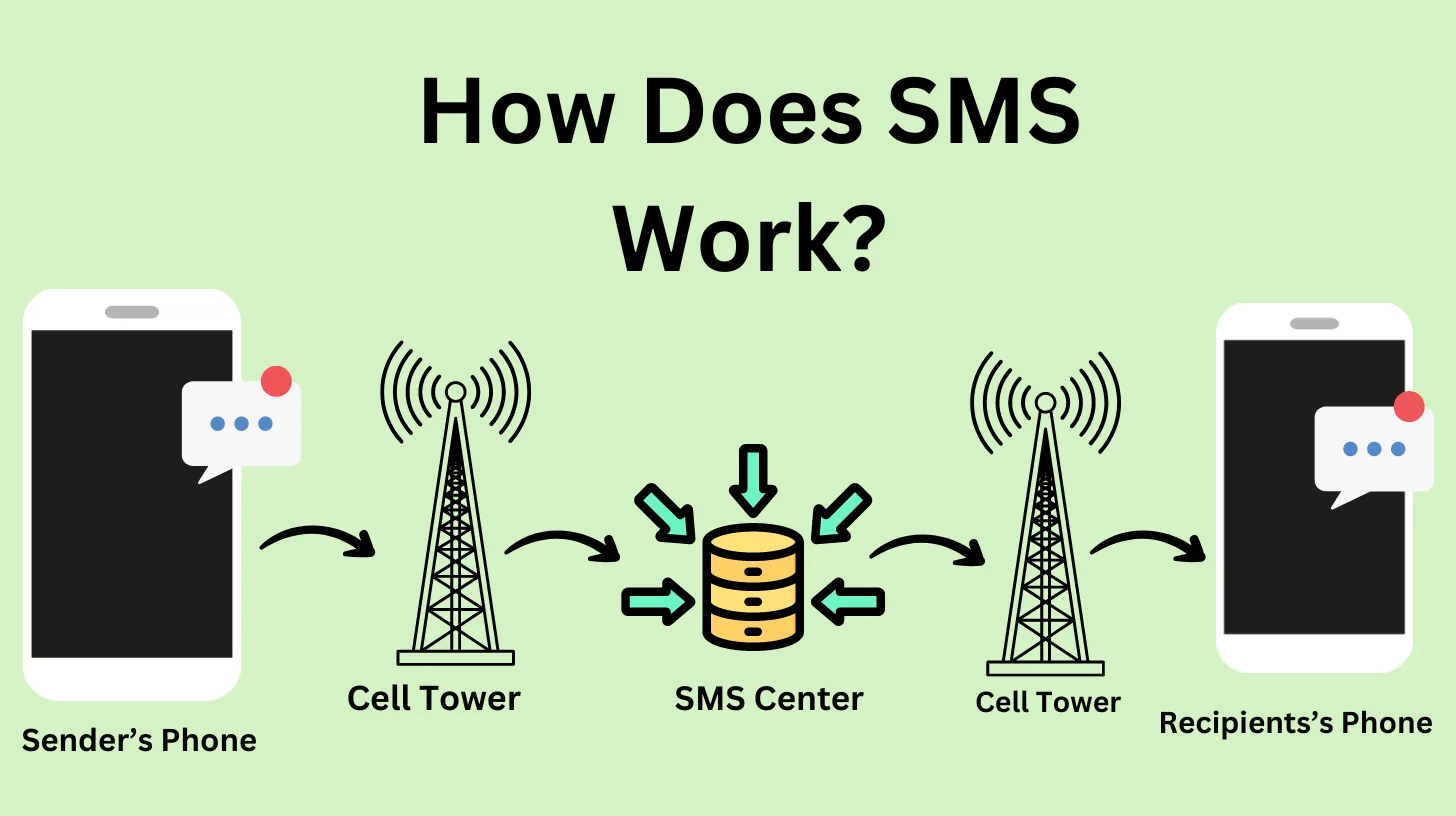
What Are the Benefits of Using SMS?
Utilizing SMS offers numerous advantages, making it a preferred communication method for both personal and business interactions. Among its key benefits is the cost-effectiveness of SMS marketing, which enables companies to reach a wide audience with minimal investment.
Furthermore, SMS facilitates user engagement through timely text notifications, enhancing customer success and driving business growth, while ensuring a reliable channel for delivering important messages to subscribers.
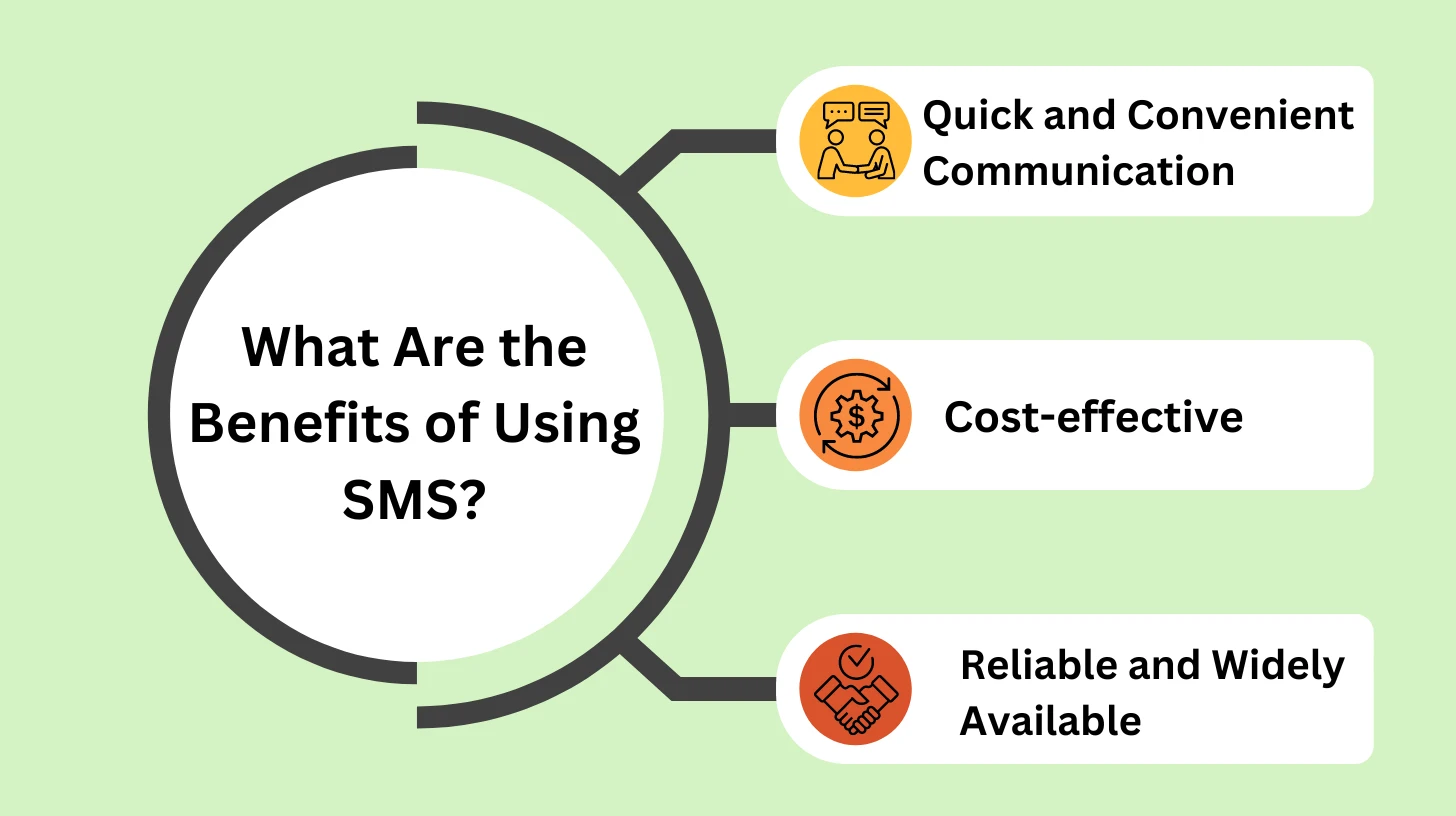
Quick and Convenient Communication
One of the primary benefits of SMS is its ability to facilitate quick and convenient communication, allowing users to send and receive text messages almost instantaneously via their mobile devices.
- Enhanced Personal Connections: Friends and family members can stay in touch effortlessly, arranging last-minute plans or sharing updates without delays.
- Efficient Business Communication: Companies can instantly reach their customers regarding promotions and updates, resulting in higher customer engagement and satisfaction.
- Time-Saving: Quick responses can streamline processes in professional settings, helping teams to make faster decisions and improve productivity.
Cost-effective
SMS is known for being a cost-effective communication solution, particularly for businesses looking to engage their customers through text message marketing campaigns, as it facilitates direct interaction while minimizing expenses.
- Instant Delivery: Messages are sent and read almost immediately, guaranteeing faster engagement.
- Higher Engagement: SMS has a 98% open rate, substantially outperforming email marketing.
- Cost-Effective: Sending SMS can be cheaper than creating and distributing print materials.
Reliable and Widely Available
The reliability of SMS technology is unmatched, as it operates on cellular networks that provide consistent message delivery, even in areas with limited internet access.
- SMS has a higher likelihood of being delivered when cellular connectivity is present.
- Text messages can be sent quickly, which is vital during critical situations.
- It is universal, compatible with all mobile devices, making it accessible worldwide.
These factors contribute to its status as a preferred mode of communication, proving its relevance in our increasingly digital-oriented world.
Can Be Used for Business Purposes
Businesses can leverage SMS for a variety of purposes, including marketing, customer engagement, and sending automated text notifications to their clientele.
- Promotional Messages: Discount notifications and limited-time offers.
- Automated Alerts: Appointment reminders and operational updates.
- Customer Support: Quick responses and feedback collection.
By weaving SMS into their communication framework, organizations not only enhance customer satisfaction but also build lasting loyalty.
What Are the Limitations of SMS?
Despite its many advantages, SMS also has several limitations that can affect its effectiveness as a communication tool. One major limitation is the character count restriction, which limits messages to 160 characters, making it challenging to convey detailed information succinctly. Additionally, SMS requires reliable cellular network coverage, and can be vulnerable to security breaches, which can compromise the integrity of sensitive information.
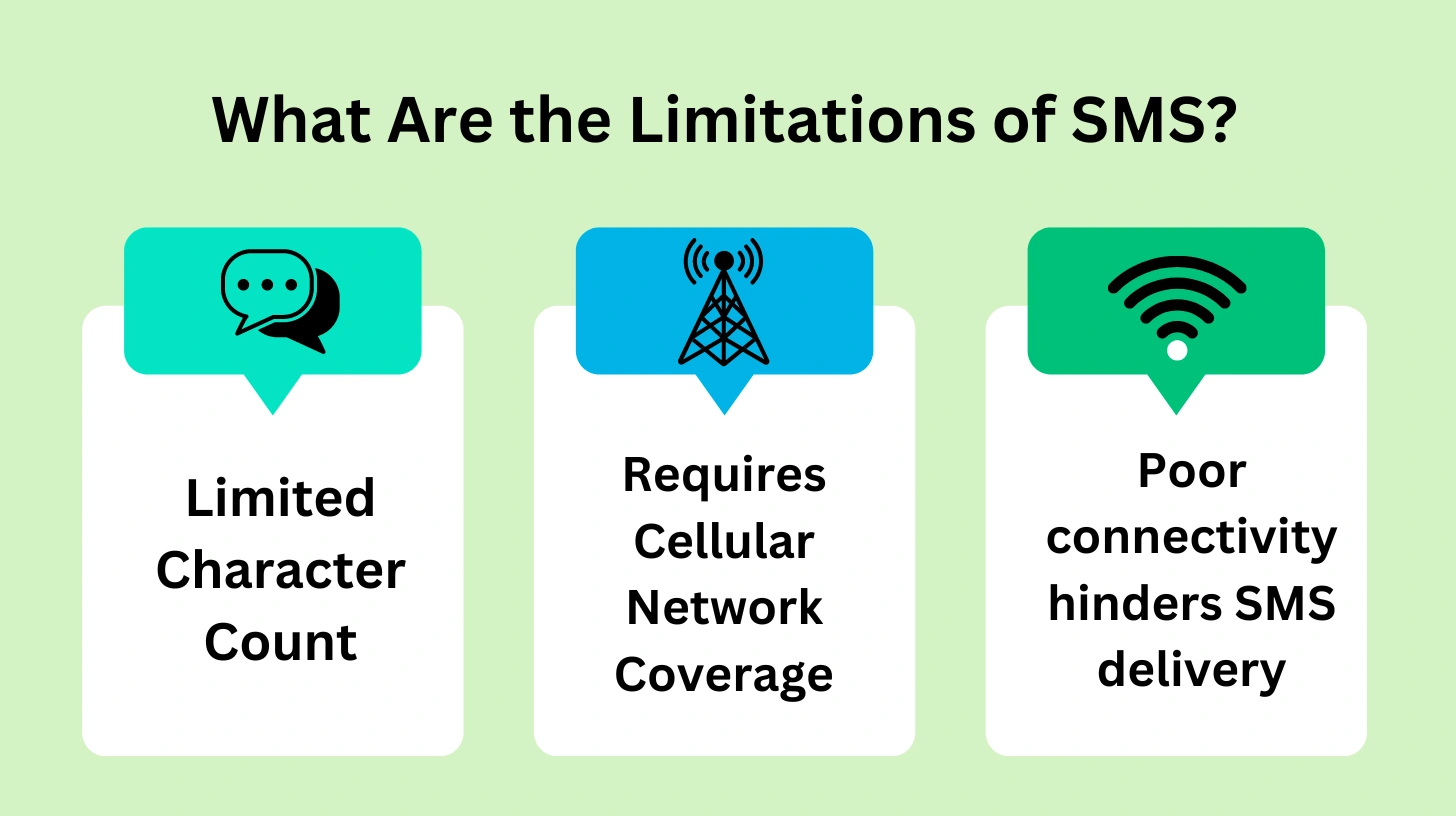
Limited Character Count
One notable limitation of SMS is its character count restriction, which allows only 160 characters per message, resulting in a need for brevity when crafting text messages.
An added complexity arises when the message requires emotional nuance or context; in such cases, users might resort to utilizing:
- emojis
- GIFs
- images
to supplement their texts. Some users also choose to bypass the limit altogether by sending multimedia messages (MMS), which allows for richer content.
Requires Cellular Network Coverage
SMS requires reliable cellular network coverage to ensure successful message delivery, which can be a limitation in remote or rural areas with poor connectivity.
In such locations, the reliability of communication can be severely impacted, causing delays, undelivered messages, and frustration among users. For many individuals in these regions, access to timely information is crucial, whether for personal or business needs. The absence of a stable cellular network can hinder not just social interactions but also emergency communications, leading to potential safety concerns.
Can Be Vulnerable to Security Breaches
SMS can also be vulnerable to security breaches, which raises concerns about the safety of sensitive information transmitted via text messages.
To protect themselves, users should always verify the sender before clicking any links and enable two-factor authentication for added security. Businesses must implement robust protocols, such as encrypted messaging services, to secure their communications and educate their staff on recognizing suspicious messages.
- Encourage the use of encrypted messaging apps.
- Conduct regular security training for employees.
- Implement periodic security audits to identify vulnerabilities.
What Are the Different Types of SMS?
SMS can be categorized into three main types: Person-to-Person (P2P) SMS, Application-to-Person (A2P) SMS, and Person-to-Application (P2A) SMS, each serving distinct communication purposes and functionalities.
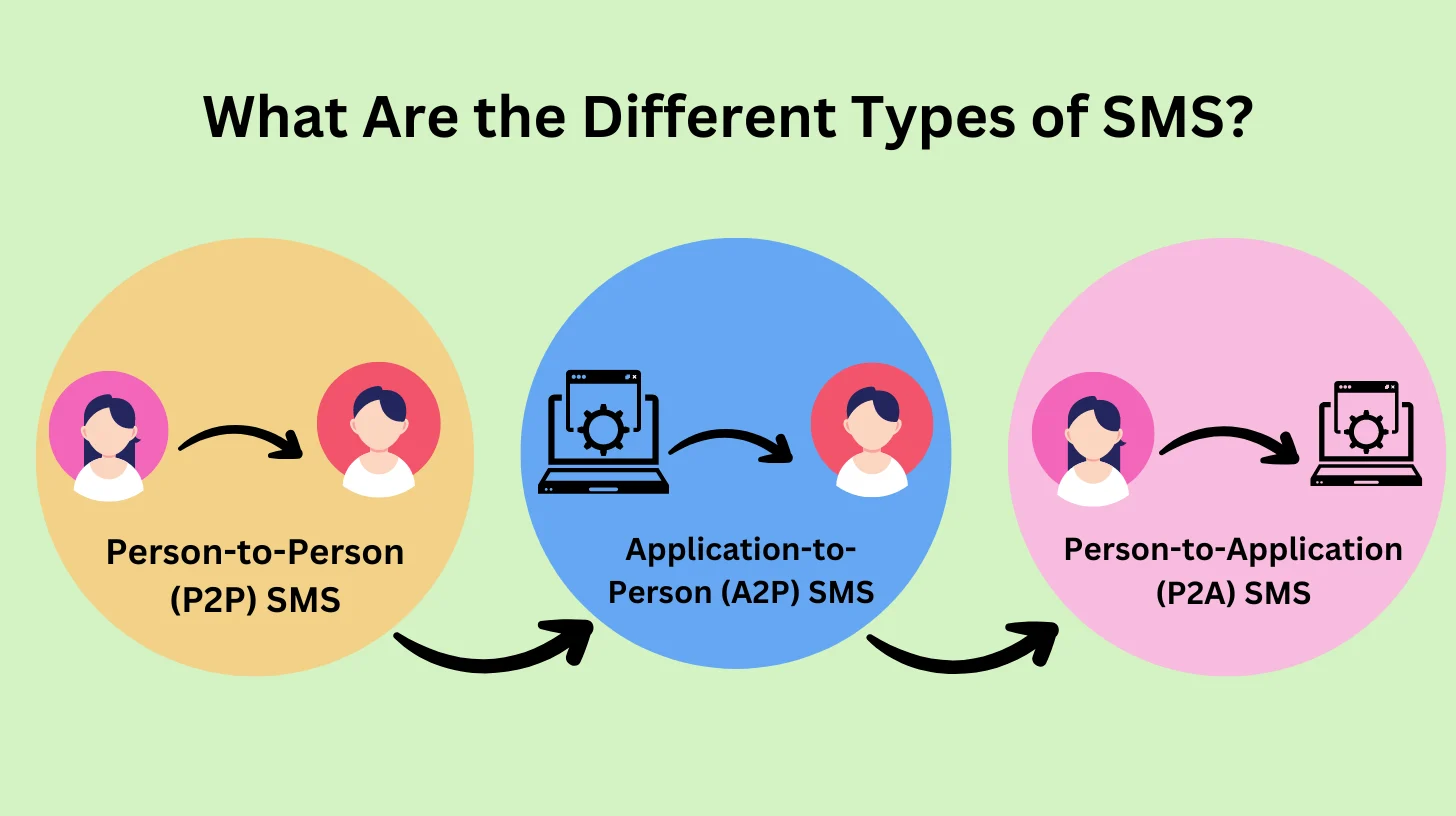
Person-to-Person (P2P) SMS
Person-to-Person (P2P) SMS is the traditional form of text messaging where messages are exchanged directly between individuals using their mobile devices.
This direct communication facilitates not just quick exchanges of information but also strengthens personal connections in an increasingly digital age. Users rely heavily on P2P SMS for various interactions, from coordinating plans with friends to sending heartfelt messages to loved ones.
Application-to-Person (A2P) SMS
Application-to-Person (A2P) SMS refers to text messages sent from applications or businesses directly to individuals, often used for notifications, alerts, and marketing purposes. This method of communication has become increasingly vital in today’s fast-paced digital landscape, where businesses seek efficient ways to engage with their customers, streamline communication, and enhance overall user experience.
A2P SMS has proven to be an invaluable tool across various industries, facilitating real-time interactions that can significantly impact customer satisfaction and retention.
Person-to-Application (P2A) SMS
Person-to-Application (P2A) SMS allows users to interact directly with applications or services by sending text messages, which can be used for feedback, requests, and information retrieval.
This innovative communication method streamlines the user experience, ensuring prompt responses and improved engagement with various platforms.
How Is SMS Used in Business?
SMS is increasingly utilized in business for a variety of applications, including marketing efforts, customer service interactions, appointment reminders, and two-factor authentication, showcasing its versatility and effectiveness in enhancing communication strategies.

Marketing and Advertising
SMS marketing and advertising leverage the immediacy and high open rates of text messages to engage customers and promote products or services effectively.
- Consider adding a sense of urgency, such as limited-time discounts.
- Incorporate personalized touches like the recipient’s name or past purchase history.
Customer Service and Support
SMS is utilized for customer service and support, allowing businesses to provide timely responses to inquiries and resolve issues quickly, enhancing user engagement.
The adoption of SMS as a communication channel significantly streamlines interactions, enabling companies to cater to customer needs more effectively.
Appointment Reminders and Notifications
Businesses frequently use SMS to send appointment reminders and notifications, ensuring that customers are informed and engaged with their scheduled services.
This method has proven to be highly effective in different sectors, particularly in reducing no-show rates. For example, healthcare providers often implement SMS notifications to remind patients of upcoming appointments, resulting in significantly lower missed visits. A study showed that using text reminders led to a 20% decrease in no-shows compared to traditional reminder methods.
Two-Factor Authentication
Two-factor authentication (2FA) often utilizes SMS as a means of user verification, providing an additional layer of security for sensitive accounts and transactions, which is crucial in today’s digital landscape where cybersecurity threats are increasingly sophisticated and prevalent.
Businesses are recognizing that relying solely on passwords is no longer sufficient, as they can be easily compromised. By integrating SMS verification, organizations can significantly bolster their security posture and protect their users’ personal and financial information.
What Is the Future of SMS?
The future of SMS is promising, with emerging technologies like Rich Communication Services (RCS), chatbots, and artificial intelligence (AI) set to enhance and transform the way we communicate via text messaging.
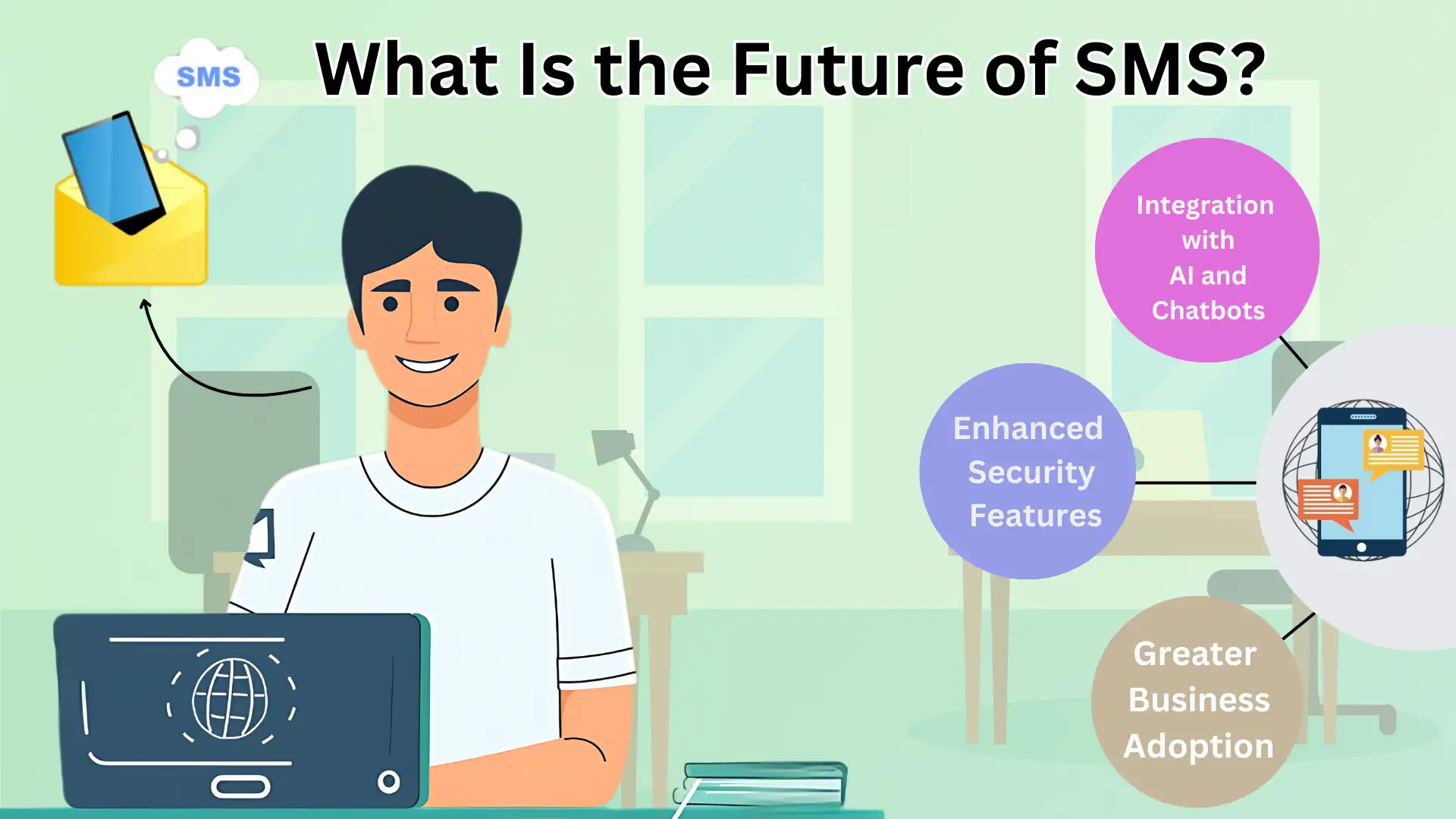
Rich Communication Services (RCS)
Rich Communication Services (RCS) is poised to enhance SMS capabilities, allowing for richer multimedia messages and greater interactivity between businesses and consumers.
- Enhanced Visuals: High-quality images and videos can be shared easily.
- Interactivity: Buttons facilitate quick actions, such as making reservations or confirming appointments with a single click.
- Branding Opportunities: Companies can customize the RCS interface, showcasing their branding effectively.
- Analytics: Businesses gain valuable insights into customer engagement through delivery and read receipts.
Chatbots and Artificial Intelligence (AI)
The integration of chatbots and artificial intelligence (AI) in SMS communication is set to revolutionize user interaction, making customer service more efficient and personalized, thereby transforming the way brands connect with their customers on a daily basis.
By effortlessly handling inquiries and providing instant responses, AI-driven chatbots enhance the overall customer experience. For instance, consider a retail brand that implements an AI chatbot capable of processing orders via SMS; customers can send a simple text to inquire about the status of their order or to initiate a return process.
Integration with Other Communication Platforms
The integration of SMS with other communication platforms is becoming increasingly important, enabling multi-channel communication strategies that enhance user experience and engagement.
- Example 1: Online retailers utilizing SMS to confirm orders and provide delivery updates.
- Example 2: Nonprofits employ SMS to send thank-you messages after email donation requests.
Conclusion
SMS, or Short Message Service, has proven to be a resilient and versatile communication tool in our digital age. Despite the rise of various messaging apps and platforms, SMS continues to play a crucial role in both personal and business communication.
Its simplicity, reliability, and wide accessibility make it an indispensable medium for quick exchanges, customer engagement, and security verification. While SMS does have limitations, such as character count restrictions and reliance on cellular networks, these constraints have also led to innovative adaptations in how we communicate concisely and effectively.
Looking to the future, SMS is poised for evolution rather than obsolescence. The integration of Rich Communication Services (RCS), AI-powered chatbots, and multi-channel communication strategies promises to enhance the capabilities of text messaging. These advancements will likely address current limitations while preserving the core strengths of SMS: its ubiquity and immediacy.
Frequently Asked Questions
SMS, or Short Message Service, is a text messaging system that allows mobile devices to send and receive brief written messages. It works by sending data through cellular networks, allowing for quick and easy communication between devices.
An SMS message can transmit up to 160 characters per message. This limit ensures that the message can be delivered quickly and efficiently, without overloading the network.
SMS is widely used for personal communication, such as texting friends and family, as well as for business notifications and authentication purposes, such as receiving verification codes for online accounts.
Yes, SMS is different from messaging apps like iMessage, WhatsApp, or Facebook Messenger. SMS messages are sent and received through cellular networks, while messaging apps use internet data to communicate.
Yes, SMS can be used for international communication, but additional charges may apply depending on your cellular plan. It’s best to check with your service provider before sending SMS messages internationally.
SMS is a simple and reliable form of communication that works on most cellular networks, making it accessible to a wide range of users. It also has a high open and response rate, making it an effective tool for businesses to reach their customers.



